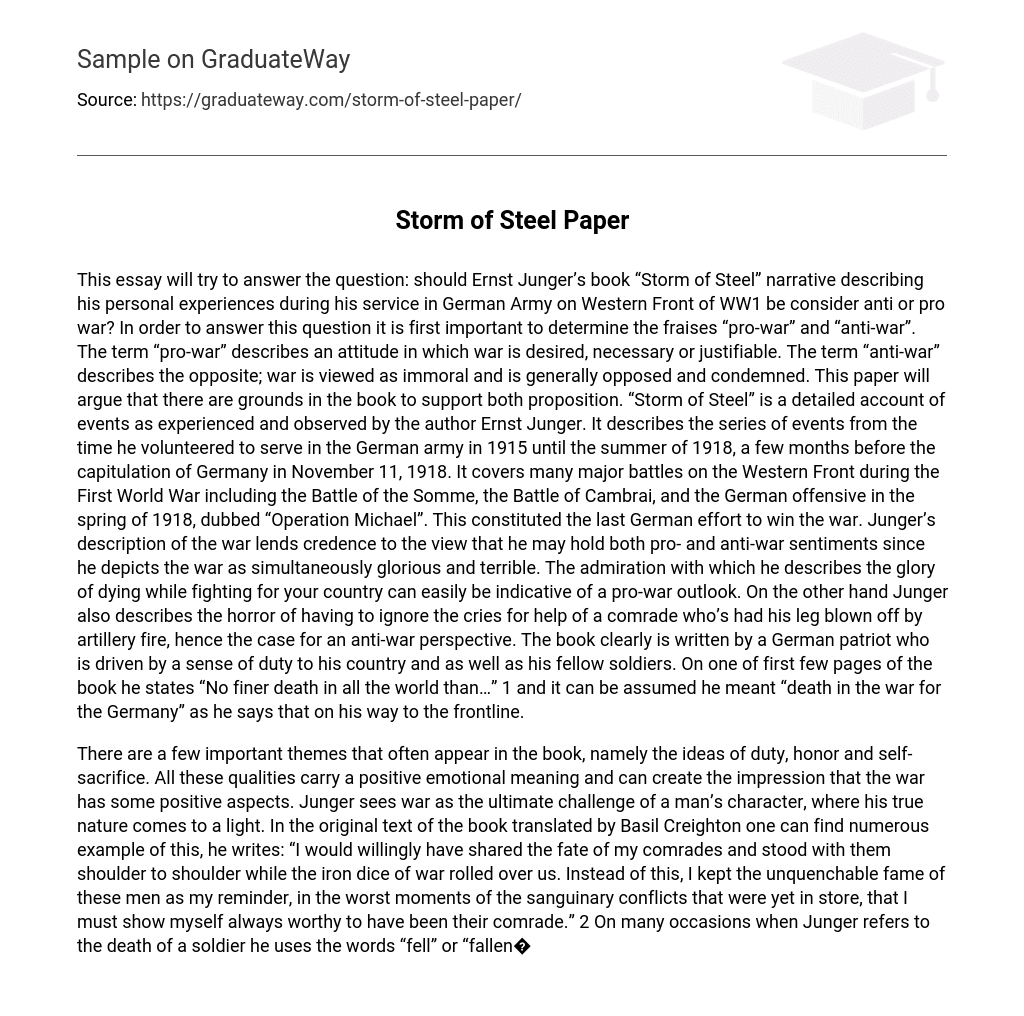This essay investigates whether Ernst Junger’s book “Storm of Steel,” which recounts his personal experiences in the German Army on the Western Front of WW1, can be categorized as either supportive or critical of war. To explore this question, it is essential to understand the definitions of “pro-war” and “anti-war.” The term “pro-war” signifies an attitude that desires, justifies, or deems war necessary. Conversely, the term “anti-war” refers to an attitude that views war as immoral and opposes and condemns it. This paper argues that Junger’s book incorporates elements supporting both pro and anti-war perspectives. “Storm of Steel” provides a detailed account of events witnessed by Junger from his enlistment in the German army in 1915 until the summer of 1918, shortly before Germany’s surrender on November 11, 1918. It encompasses significant battles on the Western Front during World War I such as the Battle of the Somme, Battle of Cambrai, and Germany’s final attempt at victory known as “Operation Michael” in spring 1918. Junger portrays war both gloriously and horrifically through vivid descriptions. His admiration for dying while fighting for one’s country may indicate a pro-war perspective. However, he also highlights contrasting experiences and perspectives on war by vividly depicting the tragedy of disregarding a fellow soldier’s pleas for aid following a severe injury.The text emphasizes how Junger’s narrative encompasses both aspects – support for war and criticism against itIn contrast, Junger portrays himself as a patriotic German driven by a sense of duty towards his country and fellow soldiers. From the beginning of the book, he strongly emphasizes that defending Germany on the battlefield is the most honorable sacrifice one can make.
The book delves into the recurring themes of duty, honor, and self-sacrifice, which Junger believes hold a positive emotional significance and highlight the beneficial aspects of war. According to him, war serves as the ultimate test of an individual’s character, unveiling their true nature. Basil Creighton’s translation provides numerous examples that support this notion. Junger expresses his willingness to share the fate of his comrades and stand by them during times of warfare. However, he finds solace in the great reputation these men possess and reminds himself always to prove deserving of their companionship even in brutal conflicts yet to come. Interestingly, when discussing a soldier’s demise, Junger frequently employs words such as “fell” or “fallen,” setting it apart from mere death or being killed. For instance, he describes Fusilier Nienhauser falling from his sentry post after suffering a gunshot wound to the forehead. The dedication of the book itself is for those who have fallen on the battlefield, implying that there exists a distinction between regular death and one occurring in combat. The death of a soldier during battle is regarded as honorable and heroic. Junger possesses unwavering faith in the strength of the German army and considers himself fortunate to serve within its ranks. The author’s fascination with power, unity, and glory becomes evident when describing encounters with helmets and blades; these further exemplify his belief in enduring spirit and immortality among the German people.
During discussions with a French couple, the subject of war’s causes often arises, suggesting that it is an intrinsic part of a nation’s existence and does not have a simple explanation.
The book extensively depicts the devastation caused by war and the hardships endured by soldiers and civilians. Junger specifically mentions Flanders, a region heavily impacted by fighting on the western front, expressing hope for its recovery after the war. This shows his awareness of war’s destructive nature and his desire to prevent it. It is evident that he opposes war when he reflects on how it affects individual soldiers and feels sadness for those who had peaceful lives before. Many other examples in the book also convey anti-war sentiments. Junger emphasizes personal responsibility and remorse, stating that even though the state may relieve us of our duties, we must still exercise our guilt. He demonstrates fairness when describing an enemy soldier from Britain, recognizing their shared humanity and commenting on the shame of having to shoot at such people.Towards the end of the book, he experiences disillusionment and fatigue from war. During those moments, a deep change came over me – a significant shift caused by the long and intense period I spent on the front lines. Despite the passing of seasons from winter to summer, the war continued persistently. Gradually, I grew weary and accustomed to the harsh realities of war. However, it was through this familiarity that my perception of everything around me became dimmer and less distinct. The clarity I once had was no longer present. It seemed as though the initial purpose that drove me to enter the battlefield had faded away and lost its importance.
The war presented new and profound challenges, marking a peculiar period. This quote portrays the author’s changing perspective on the war from initially embracing patriotic notions of duty, honor, sacrifice, and glorification of war to gradually adopting disillusionment, uncertainty, and war-weariness. This shift in outlook is common among soldiers and civilian populations involved in World War I as they were influenced by nationalistic propaganda at first but their perception changed over time due to the harsh realities of total war. The book “Storm of Steel” effectively depicts both the pro-war and anti-war perspectives.





